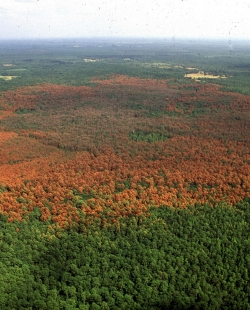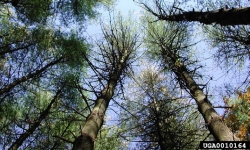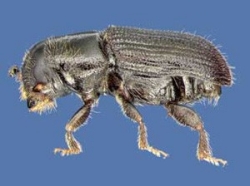Southern Pine Beetle Cost Share for Landowners
Southern Pine Beetle Initiative
The Southern Pine Beetle Initiative (SPBI) was developed to encourage landowners to proactively manage their pine forest stands and make them more resilient to beetle infestations. Funds are provided by the USDA Forest Service and administered by the Tennessee Department of Agriculture Division of Forestry (TDF).
SUMMARY
Southern pine beetle (SPB) epidemics drastically change the distribution of pine forest types on Tennessee’s landscape, interfere with the economic value of the resource, and negatively impact watersheds and wildlife habitat. The most recent outbreak of SPB began in 1998 in east Tennessee and continued through 2001 in Southwest Tennessee. The majority of the estimated 350,000 impacted acres occurred on private family-owned woodlands. The value of pine trees killed was estimated to be $358 million.
The Southern Pine Beetle Initiative (SPBI) was created in August of 2001 to encourage landowners to reduce the vulnerability of existing and newly established pine stands to beetle infestations. This is done by providing financial assistance (cost share) to encourage stand establishment practices and intermediate treatments known to suppress or reduce the chances of beetle attack. Cost share practices also encourage active management of pine woodlands statewide and restoration of shortleaf pine to the Tennessee landscape.
Cost share sign-up periods occur four times throughout the year. Interested landowners should contact their local Area Forester to determine eligibility and complete the planning process prior to sign-up.
COST SHARE FOR LANDOWNERS – SPBI Hazard Reduction Cost Share: Re-establishing Stands
SPBI Hazard Reduction Cost Share is an incentive for landowners to re-establish stands harvested or killed by SPB. Eligible practices include site preparation and planting of seedlings at wider spacings that reduce over-crowding and yield heathier forests. The cost share amount is based on the components required by the forester and the corresponding rates and maximums found below. Maximum cost share for all SPBI practices combined is up to $20,000 per landowner per year.
| COMPONENT DESCRIPTION |
COST SHARE RATE |
MAXIMUM PER UNIT |
|---|---|---|
| SITE PREPARATION (prior to planting thru June after planting) |
||
| Chemical and/or mechanical control of vegetation; higher maximum is only eligible where needed for stand establishment; stump removal and smoothing operations are not eligible. |
50% |
$50.00 per acre - woody control |
| 50% |
$35.00 per acre - herbaceous control |
|
| 50% |
$100.00 per acre – woody control (chemical/mechanical) |
|
| Prescribed burning site preparation for control of competition; for natural regeneration of shortleaf pine or desirable species; cost share not available for non-silvicultural purposes |
50% |
$30.00 per acre - prescribed burning |
| Site preparation for natural regeneration of hardwoods |
50% |
$55.00 per acre - natural regeneration |
| PINE REFORESTATION |
||
| Planting pine on applicable cutover timberlands |
50% |
$60.00 per acre - loblolly pine |
| 50% |
$65.00 per acre - shortleaf pine |
|
| 50% |
$75.00 per acre - white pine |
|
| 50% |
$45.00 per acre - planting pine (labor only) |
|
SPBI RISK REDUCTION COST SHARE: Improving an Existing Stand
SPBI Risk Reduction Cost Share is an incentive for landowners to improve existing pine stands or suppress SPB infestations. Eligible practices include pine release from competition, precommercial thinning, and suppression of active SPB spots. The cost share amount is based on the components required by the forester and the corresponding rates and maximums found below. Maximum cost share for all SPBI practices is up to $20,000 per landowner per year.
| COMPONENT DESCRIPTION |
COST SHARE RATE |
MAXIMUM PER UNIT |
|---|---|---|
| COMPETITION CONTROL IN PINE STANDS |
||
| Chemical and/or mechanical release of 1 to 10 year old pine stands, planted at densities of 300 to 600 trees per acre |
50% |
$50.00 per acre - woody vegetation control |
| Chemical and/or mechanical release of 1 to 10 year old pine stands, planted at densities of 300 to 600 trees per acre |
50% |
$35.00 per acre – herbaceous control |
| Prescribed burning for release of pine trees with fire resistant bark thickness |
50% |
$30.00 per acre - prescribed burning |
| THINNING PINE STANDS |
||
| Pre-commercial thinning of stressed and overstocked pine stands where initial stocking of planted seedlings was 300 and 600 per acre |
50% |
$55.00 per acre - non-commercial thinning |
| PINE BEETLE SUPPRESSION |
||
| Suppression of active southern pine beetle (SPB) spots and adjacent buffer strips |
50% |
>Priority Practice< $250 per acre - Southern Pine Beetle Suppression |
Eligibility
Eligible landowners include private individuals, joint owners, corporations (except wood using industries) without publicly traded stock, and non-profit organizations. Ineligible lands include lands controlled by federal, state, and local governments, wood using industries or entities deriving more than 50% of their gross income from wood using industries, corporations with publicly traded stock, public utility companies, and commercial campgrounds, hunting reserves, and recreation areas.
Eligible stands include pine stands harvested, infested, or killed by Southern Pine Beetle (SPB), pine stands needing SPB suppression, thinning, existing stands of seedlings needing release, and existing stands of seedlings needing replanting. Pine stands are defined as having more than 50% of their basal area in pine prior to SPB attack.
Click here for a printable version of this information.


